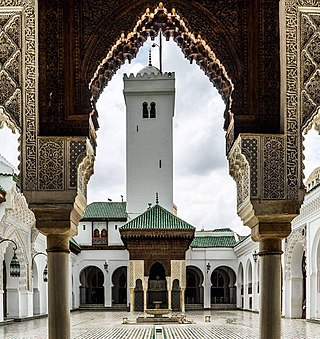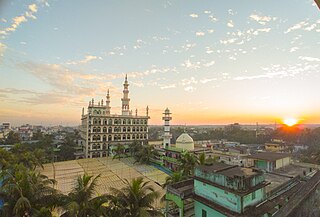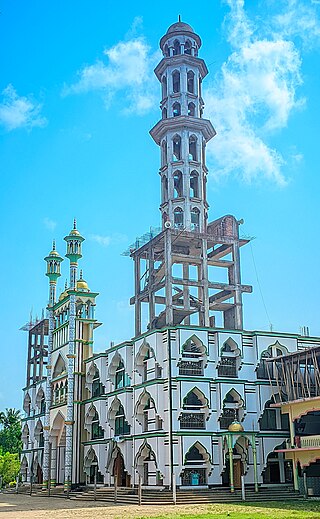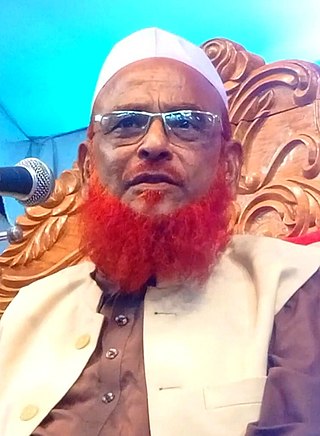
Madrasa, sometimes transliterated as madrasah or madrassa, is the Arabic word for any type of educational institution, secular or religious, whether for elementary education or higher learning. In countries outside the Arab world, the word usually refers to a specific type of religious school or college for the study of the religion of Islam, though this may not be the only subject studied.

Education in Indonesia falls under the responsibility of the Ministry of Education, Culture, Research, and Technology and the Ministry of Religious Affairs. In Indonesia, all citizens must undertake twelve years of compulsory education which consists of six years at elementary level and three each at middle and high school levels. Islamic, Christian and Buddhist schools are under the responsibility of the Ministry of Religious Affairs.

The University of al-Qarawiyyin, also written Al-Karaouine or Al Quaraouiyine, is a university located in Fez, Morocco. It was founded as a mosque by Fatima al-Fihri in 857–859 and subsequently became one of the leading spiritual and educational centers of the Islamic Golden Age. It was incorporated into Morocco's modern state university system in 1963 and officially renamed "University of Al Quaraouiyine" two years later. The mosque building itself is also a significant complex of historical Moroccan and Islamic architecture that features elements from many different periods of Moroccan history.

Imam Mohammad Ibn Saud Islamic University (IMSIU) (Arabic: جامعة الإمام محمد بن سعود الإسلامية), commonly known as Al-Imam University, is a public university in the sub-municipality of Shemal in Riyadh, Saudi Arabia. It was founded in 1950 as an Islamic seminary by Muhammad ibn Ibrahim ash-Sheikh, the first Grand Mufti of Saudi Arabia. It was renamed the College of Sharia in 1953, before becoming a full-fledged university through amalgamations of other colleges and assuming its current name in 1974. The university also has overseas presence in Indonesia and Djibouti.

The University of Jordan, often abbreviated UJ or JU, is a public university located in Amman, Jordan. Founded in 1962 by, and it is the largest and oldest institution of higher education in Jordan. It is located in the capital Amman in the Jubaiha area of the University District. It is composed of 25 faculties, and offers 91 bachelor programs and 161 postgraduate programs. The university's stated main strategy and rule is to be global and productive in all its educational fields.
Islamic education may refer to:
An ijazah is a license authorizing its holder to transmit a certain text or subject, which is issued by someone already possessing such authority. It is particularly associated with transmission of Islamic religious knowledge. The license usually implies that the student has acquired this knowledge from the issuer of the ijaza through first-hand oral instruction, although this requirement came to be relaxed over time. An ijaza providing a chain of authorized transmitters going back to the original author often accompanied texts of hadith, fiqh and tafsir; but also appeared in mystical, historical, and philological works, as well as literary collections. While the ijaza is primarily associated with Sunni Islam, the concept also appears in the hadith traditions of Twelver Shia.

Al-Jāmiʿah al-Ahliyyah Dār al-ʿUlūm Muʿīn al-Islām, popularly known as the Hāṭhazārī Madrasah or the Great Madrasah, is a Qawmi institution of Hathazari, located in Bangladesh's Chittagong District. Established in 1901, it is the largest and oldest Deobandi seminary in the country. According to a 2009 National Bureau of Asian Research report, the highly reputed institution ranks among top ten madrasah in the subcontinent.

Al-Jāmiʿah Al-Islāmiyyah Patiya, better known simply as Patiya Madrasa and formerly known as Al-Madrasah Aḍ-Ḍamīriyyah Qāsim al-ʿUlūm, is a Qawmi Madrasah located in Patiya Upazila of Chittagong District, Bangladesh. It was established in 1938 by Azizul Haq under the direction of Zamiruddin Ahmad. It is also known as an International Islamic University. It has a role in the promotion of Islam in Bangladesh, inclusion of Qawmi Madrasas under one syllabus, providing modern and higher education for scholars.
Qawmi Madrasah is an adjective describing one of the two major madrasah educational categories in Bangladesh. The Qawmi madrasahs are not regulated by the Bangladesh Madrasah Education Board. As private charitable organizations, Qawmi madrasahs are supported almost exclusively by donation.

Al-Jāmiʿah al-Qurʼāniyyah al-ʿArabiyyah Lālbāgh, better known simply as Lalbagh Madrasah, is a Qawmi madrasa providing higher Islamic studies in Dhaka, Bangladesh. It has seven education sections from kindergarten to post-graduate levels.

Al-Jāmiʿah al-Islāmiyyah al-Yūnusiyyah, also known as Jamia Islamia Yunusia, is one of the Qawmi Jamiahs of Bangladesh located in the neighbourhood of Paikpara in Brahmanbaria. As of 1998, it controlled most of the other madrasahs in Brahmanbaria.
Farah Antun, also spelled Farah Antoun, was among the first Lebanese Christians to openly argue for secularism and equality regardless of religious affiliation. He also, though uncommon for his background, argued against Arab nationalism. Antun became popular for his magazine, Al Jamiah, and his public debate with Muhammad Abduh over conflicting worldviews.

Al-Jāmiʿah al-Islāmiyyah ʿAzīz al-ʿUlūm Bābūnagar, better known simply as Babunagar Madrasah, is one of the well-known Qawmi madrasahs in Chittagong. Established in 1924, situated at Babunagar, Fatikchhari, there are at present about 3000 students acquiring education.

Idris Kandhlawi was a Pakistani Sunni scholar during the mid-twentieth century, widely recognized for his contributions to various fields of Islamic studies, including hadith, Quranic studies, Islamic jurisprudence, Prophetic biography, and theology. Holding the titles of Sheikh al-Hadith and Sheikh al-Tafsir, he traced his lineage to Abu Bakr on his father's side and Umar on his mother's side. He studied in Thana Bhawan under Ashraf Ali Thanwi. He studied hadith, first at Mazahir Uloom under Khalil Ahmad Saharanpuri, and later at Darul Uloom Deoband under Anwar Shah Kashmiri. He started his professional career at Madrasa Aminia and later went to Darul Uloom Deoband. In 1929 he took a position in Hyderabad State, where he had access to the Asafia Library. This experience enabled him to produce a five-volume Arabic commentary on Mishkat al-Masabih titled Al-Taleeq al-Sabeeh, of which the first four volumes were published in Damascus. His scholarly work garnered recognition in the Arab world. He later assumed the roles of Sheikh al-Tafsir at Darul Uloom Deoband and Sheikh al-Hadith wa al-Tafsir at Jamia Ashrafia. In addition, he served as the Chancellor of Islamia University of Bahawalpur during its tenure as Jamia Abbasia.

The West Bengal Board of Madrasah Education is the state government administered autonomous examining authority for affiliated and recognized madrasahs in West Bengal, India. Perhaps among the oldest post-secondary boards in India, it is the only madrasah board that is recognized by the Government of India. It is one of the parastatal organization of the Minority Affairs and Madrasah Education Department. The West Bengal Board of Madrasah Education is the West Bengal state government administered autonomous examining authority for the High Madrasah examination of West Bengal, India. It has come into force by the West Bengal Board of Madrasah Education Act-1994.
Madrasahs in Singapore are full-time, religious institutions that offer a pedagogical mix of Islamic religious education and secular education in their curricula. While the Arabic term 'madrasah' literally translates to 'school', whether religious or secular, the term 'madrasah' is legally and colloquially defined in Singapore today as an 'Islamic religious school'. There are currently six madrasahs in Singapore offering primary to tertiary education, namely, Aljunied Al-Islamiah, Irsyad Zuhri Al-Islamiah, Al-Maarif Al-Islamiah, Alsagoff Al-Arabiah, Al-Arabiah Al-Islamiah, and Wak Tanjong Al-Islamiah. Four of them are co-educational, while the other two offer madrasah education exclusively to girls.

Ar-Raniry State Islamic University Banda Aceh (Bahasa Indonesia: Universitas Islam Negeri Ar-Raniry Banda Aceh or it is simply called UIN Ar-Raniry, is a public Islamic university in Banda Aceh, Aceh Province, Indonesia. The University is run under the auspices of the Ministry of Religious Affairs of the Republic of Indonesia.

Nurul Islam Olipuri is an Islamic scholar of Bangladesh. Olipuri is best known for his interpretation of the Qur'an.
Badedeorail Fultali Kamil Madrasa is an Islamic educational institution located in Zakiganj, Sylhet District, Bangladesh. The madrasa was founded in 1920, and is now affiliated with the Islamic Arabic University for degree and honours programmes.













